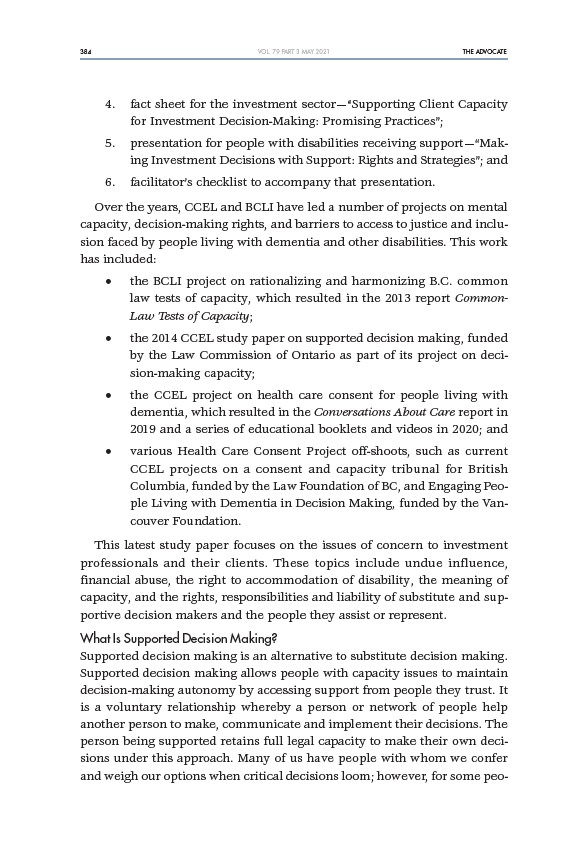
384 THE ADVOCATE
VOL. 79 PART 3 MAY 2021
4. fact sheet for the investment sector—“Supporting Client Capacity
for Investment Decision-Making: Promising Practices”;
5. presentation for people with disabilities receiving support—“Making
Investment Decisions with Support: Rights and Strategies”; and
6. facilitator’s checklist to accompany that presentation.
Over the years, CCEL and BCLI have led a number of projects on mental
capacity, decision-making rights, and barriers to access to justice and inclusion
faced by people living with dementia and other disabilities. This work
has included:
• the BCLI project on rationalizing and harmonizing B.C. common
law tests of capacity, which resulted in the 2013 report Common-
Law Tests of Capacity;
• the 2014 CCEL study paper on supported decision making, funded
by the Law Commission of Ontario as part of its project on decision
making capacity;
• the CCEL project on health care consent for people living with
dementia, which resulted in the Conversations About Care report in
2019 and a series of educational booklets and videos in 2020; and
• various Health Care Consent Project off-shoots, such as current
CCEL projects on a consent and capacity tribunal for British
Columbia, funded by the Law Foundation of BC, and Engaging People
Living with Dementia in Decision Making, funded by the Vancouver
Foundation.
This latest study paper focuses on the issues of concern to investment
professionals and their clients. These topics include undue influence,
financial abuse, the right to accommodation of disability, the meaning of
capacity, and the rights, responsibilities and liability of substitute and supportive
decision makers and the people they assist or represent.
What Is Supported Decision Making?
Supported decision making is an alternative to substitute decision making.
Supported decision making allows people with capacity issues to maintain
decision-making autonomy by accessing support from people they trust. It
is a voluntary relationship whereby a person or network of people help
another person to make, communicate and implement their decisions. The
person being supported retains full legal capacity to make their own decisions
under this approach. Many of us have people with whom we confer
and weigh our options when critical decisions loom; however, for some peo-